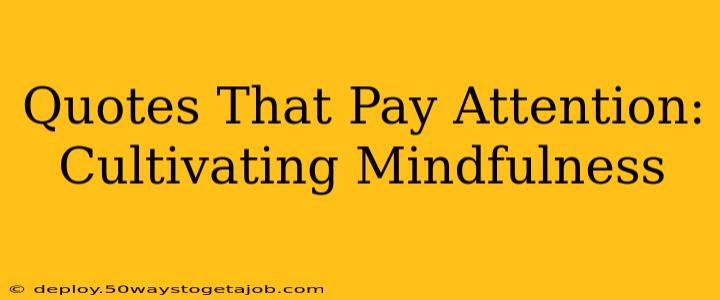In our relentlessly fast-paced world, mindfulness can feel like a luxury, a fleeting moment snatched between obligations. Yet, the simple act of pausing, reflecting, and truly seeing can transform our experience. One powerful tool for cultivating this mindful state is the thoughtful consideration of quotes – not just reading them, but truly absorbing their wisdom. This post explores how thoughtfully engaging with quotes can foster mindfulness and enhance our lives.
What is Mindfulness, and Why is it Important?
Before delving into the power of quotes, let's establish a foundation. Mindfulness is the practice of paying attention to the present moment without judgment. It's about being fully aware of your thoughts, feelings, bodily sensations, and the world around you. It's not about emptying your mind, but rather about acknowledging and accepting whatever arises without getting swept away by it. Why is it important? Mindfulness has been shown to reduce stress, improve focus, increase self-awareness, and foster emotional regulation. It's a cornerstone of mental wellbeing.
How Quotes Can Cultivate Mindfulness
Quotes, especially those penned by insightful thinkers and poets, offer a portal to mindful reflection. They act as micro-meditations, prompting us to pause, consider their meaning, and relate them to our own lives. The process of engaging with a quote isn't just passive reading; it's an active engagement that strengthens our mindfulness practice.
Here's how:
- They encourage slowing down: In our hurried lives, taking the time to read and contemplate a quote encourages a slower pace, breaking the cycle of reactivity.
- They spark self-reflection: A well-crafted quote can prompt introspection, inviting us to examine our own thoughts, beliefs, and behaviors.
- They offer new perspectives: A quote can offer a different way of looking at a situation or challenge, opening our minds to possibilities we might have overlooked.
- They provide solace and comfort: During difficult times, a poignant quote can offer comfort and reassurance, providing a sense of connection and understanding.
How to Use Quotes for Mindfulness Practice
Simply reading quotes isn't enough. To truly harness their power for mindfulness, engage with them actively:
- Read slowly and deliberately: Don't rush through the words. Savor each phrase, allowing its meaning to sink in.
- Consider the context: Understanding the background of the quote – who wrote it, when, and why – can enrich its meaning.
- Relate it to your own life: Think about how the quote resonates with your own experiences and challenges. How does it apply to your current situation?
- Journal your reflections: Writing down your thoughts and feelings about the quote can deepen your understanding and make the experience more meaningful.
- Meditate on the quote: Use the quote as a focal point for meditation. Repeat the words to yourself, focusing on their meaning and allowing them to settle into your mind.
Examples of Mindfulness Quotes
Let's explore a few quotes that lend themselves to mindful reflection:
-
"The present moment is filled with joy and happiness. If you are attentive, you will see it." – Thich Nhat Hanh: This quote encourages us to actively search for joy and happiness in the present, rather than dwelling on the past or worrying about the future.
-
"Be present in all things and thankful for all things." – Unknown: A simple yet profound reminder to appreciate the beauty and wonder of the present moment.
-
“What lies behind you and what lies in front of you, pales in comparison to what lies inside of you.” – Ralph Waldo Emerson: This quote encourages inward reflection and recognizing our inner strength and wisdom.
People Also Ask: Addressing Common Questions about Mindfulness
Here are some frequently asked questions about mindfulness and how quotes can enhance the practice:
How can I incorporate mindfulness into my daily routine?
Start small. Try incorporating short mindfulness practices throughout your day, such as mindful breathing exercises, body scans, or mindful eating. Even a few minutes of focused attention can make a difference. Include mindful engagement with a quote as part of this routine.
Are there different types of mindfulness?
Yes, there are various mindfulness practices, including meditation, yoga, mindful walking, and mindful eating. The key is to find practices that resonate with you and incorporate them into your daily life.
How do I know if I'm practicing mindfulness correctly?
There's no right or wrong way to practice mindfulness. The goal is to simply pay attention to the present moment without judgment. If your mind wanders, gently guide it back to your focus.
Can mindfulness help with anxiety and depression?
Mindfulness-based practices have been shown to be effective in reducing symptoms of anxiety and depression. It provides tools to manage difficult emotions and thoughts.
What are some resources for learning more about mindfulness?
Numerous books, apps, and online courses are available to help you learn more about mindfulness. Explore resources that resonate with your learning style.
By thoughtfully engaging with quotes and actively incorporating mindfulness practices into our daily lives, we can cultivate a deeper appreciation for the present moment and find greater peace and clarity. The journey to mindfulness is a continuous process, and every mindful moment is a step closer to a richer, more fulfilling life.
